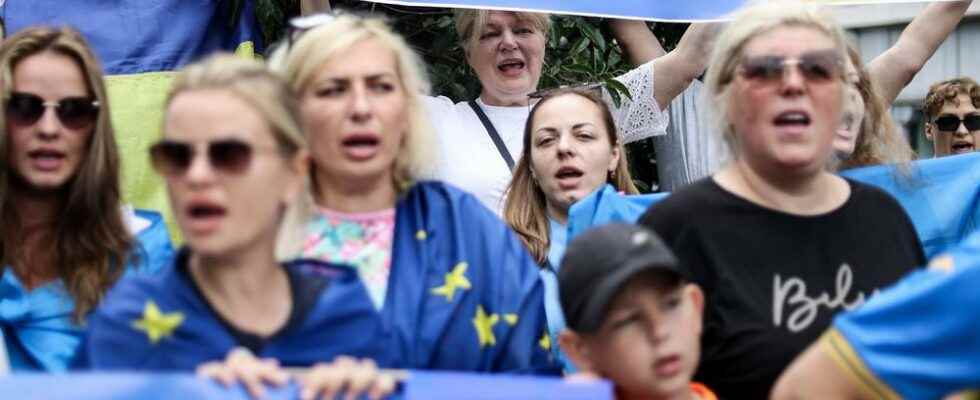“Finally a day off!” rejoices this senior European diplomat in front of his guests. I will be able to enjoy dinner because, miraculously, my French colleague has not scheduled a meeting in the next forty-eight hours. he already feels guilty…” At the start of the summer, Brussels is coming out exhausted from the last six months, carried by the French presidency of the Council of the European Union.
Even before the war in Ukraine, Paris had announced an ambitious semester. From February 24, the program became daunting: more than 2,150 meetings in the European capital, including almost 70 of the Committee of Permanent Representatives, the main negotiating body between the Member States. It’s much more than during previous presidencies, despite being faced with a pandemic. “When the war broke out, we briefly asked ourselves the question of concentrating on its consequences, recalls Philippe Léglise-Costa, permanent representative of France to the EU. But we decided to continue to advance on our priorities, which turned out to be relevant.”
The priorities ? A long list, ranging from the supervision of digital platforms to the Green Climate Pact, via the European minimum wage or the reform of the Schengen area. “We worked like crazy,” breathes a diplomat. “Every day from 8 a.m. to 11 p.m., part of the weekend and the phone always at hand. There was no more room for anything else in our lives”, details another source, who says to himself ” flushed but proud”.
Unprecedented legislative speed
In Brussels, some French officials have specialized in Ukraine in order to coordinate European action. Only one week after the Russian invasion, the Twenty-Seven activated legislation never used before, in order to offer temporary protection to Ukrainian refugees as quickly as possible. The ministers worked in one room, the experts in another. Never seen.
Same operation for the “strategic compass”, this document responsible for framing the common defense and security policy, planned by France but reinforced urgently at the start of the war. On March 21, the ministers are already assembled when the French ambassador comes in extremis to whisper in the ear of the head of European diplomacy that the senior officials have reached an agreement. Sometimes, it is legislative texts that have been modified at full speed to adapt to the new reality, such as that on the judicial cooperation agency Eurojust, which was to be able to store evidence of war crimes.
The French have sometimes given the impression of multiplying. Thus, in thirty-six hours, on June 6 and 7, three agreements fell in quick succession, after three separate negotiations: a framework for a European minimum wage, a universal charger for mobile phones, and more women on management boards. administration of large companies. The same person appears in the three photos immortalizing the compromises between the European institutions: Deputy Ambassador Fabrice Dubreuil. A hologram? Not even ! Rather the reflection of a tight schedule and effective tactical calculations.
Protesters in favor of Ukraine’s accession to EU candidate status gathered in Brussels on June 23, 2022
afp.com/Kenzo TRIBOUILLARD
At the end of June, Charles Michel, the President of the European Council, expressed his “gratitude” to the French teams. “We must be pleased that it is a country the size of France which has occupied the presidency in time of war, analyzes a European. It is also our only member of the Security Council. Imagine if it had been a more little…”
The French ability to deal with all subjects simultaneously would almost make our neighbors jealous. “As it was France, we had quite high expectations, but what makes the difference is the human resources,” notes the representative of a smaller nation. “You had two elections, a war in Europe, the biggest refugee crisis since 1945. Despite all this, you managed to convince the other ministers to move forward on the migration file”, launched Ylva Johansson, the European Commissioner to Internal Affairs, to Gérald Darmanin on June 10. The tenant of Place Beauvau had just won an agreement on two pieces of legislation for better control of the EU’s external borders.
“We did 95% of what we had planned”
On the legislative level, the results are more than positive, even if the latest results on the Green Pact are still awaited. If the States agree, only the text on the taxation of multinationals will have failed, on a Hungarian veto. “We did 95% of what we planned,” says a source.
“The presidency stricto sensu has worked very well,” says Eric Maurice, who heads the Brussels office of the Robert-Schuman Foundation. He nevertheless tempers: “France wanted to make it a political platform for its vision of Europe very much embodied by its president, and there the results are more contrasted.” The war thus revitalized NATO and the American presence in Europe, while Paris wanted to push its concept of European strategic autonomy in matters of defence. Emmanuel Macron’s position vis-à-vis Moscow and his desire “not to humiliate Russia” have offended the countries of Central and Eastern Europe. “It tarnishes the picture,” notes an observer. Visiting kyiv on June 16, the French president toned down the criticism.
France is now handing over to the Czech Republic. Some, despite the exhaustion, see the end of this sequence with regret. “I had a blast, I’m ready to start again for six months if I’m given a fortnight’s vacation,” says an enthusiast. For the next French presidency, however, we will have to wait until July 2035.
